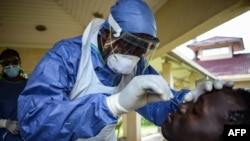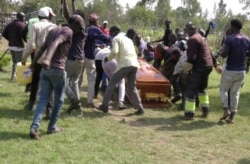Kenya's western city of Kisumu has surpassed the capital, Nairobi, as having the country's highest number of confirmed COVID-19 infections. The jump in cases comes a day after an opposition leader addressed large crowds in Kisumu, which also reported Kenya's first case of the variant first spotted in India.
According to the Health Ministry, the county of Kisumu is recording a high number of COVID-19 positive cases.
The lakeside city Tuesday recorded almost a third of all 382 positive cases recorded in the country.
Kisumu County Health Minister Boaz Otieno says the outbreak has escalated over past 10 days or so.
“We are a major transmission zone to date," said Otieno. "We have over 4,000 cases that have been confirmed as of the end of last week, and about 3,000 or so of them had been diagnosed in the last seven days.”
Otieno blames Kisumu’s increase on the easing of restrictions in the capital Nairobi and surrounding areas.
"There was an inevitable rebound influx. Generally, there is a lot of traffic between Kisumu, Nakuru and Nairobi," said Otieno. "So if you confine people and then you release the tendency is people to kind of rebound and go back home.”
In late March, President Uhuru Kenyatta restricted people's movements in Nairobi and in the counties of Kajiado, Nakuru, Kiambu and Machakos in an effort to contain a rise in COVID-19 cases.
The president eased restrictions a month later.
Health officials have warned the country may witness another wave of cases in July if people continue to disregard health protocols designed to limit the spread of the coronavirus.
The increase in infections comes as Kisumu County prepares to host an Independence Day ceremony on June 1 that Kenyatta is set to attend.
Leunora Odinga is a Kisumu resident who has mixed feelings about the upcoming event.
“I may be worried but at the same time anxious to see my president come and talk to us. Some of us have not seen him," Odinga said. "We need development and without development, we cannot prosper. It’s the people who have to take precautions to take care of themselves.”
Two weeks ago, Kisumu was the first town in Kenya to record a case of the Indian COVID-19 variant.
Otieno said there is nothing to worry about and health protocols will be followed during the ceremony.
“For the main venue will have a very limited number, the stadium has a population capacity of over 30,000 but it will only allow 3,000 people in by invitation and the siting will be very controlled. Ensuring masks and washing of hands will be ensured," Otieno said. "
Kenya’s Health Minister Mutahi Kagwe said Tuesday that at least 950,000 people countrywide were vaccinated against the coronavirus.
The East African nation has recorded 169,000 COVID-19 cases and more than 3,000 deaths from the disease.





